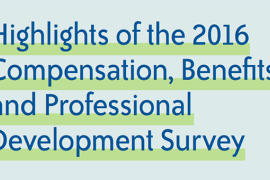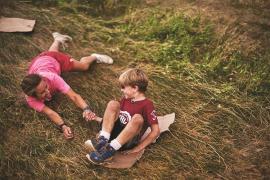Yes, I said it. “Research” — that nasty stuff your teachers make you do in school, typically involving math, Excel, APA citations, etc. When I was in school, writing research papers always felt so stiff, so stifling. As a college professor, I see my students break out in hives at the sheer thought of research, and then I feel their angst when I read what they come up with. I get it, research has a bad rap, but like it or not, it is one of the most valued skills in the job market.
The Association of American Colleges and Universities (AAC&U), for example, names inquiry and analysis and information literacy among its essential learning outcomes for college students (2017). This same organization also surveyed employers about what they look for most in college graduates, and 81 percent indicated analytic reasoning and 68 percent indicated information literacy among their priorities for new hires (AAC&U, 2017). Forbes recently reported the “10 Skills Employers Most Want,” and “ability to obtain and process information” was in the top five (Adams, 2014). Clearly, research that involves finding reliable information, analyzing it, and applying it is a pretty powerful addition to any resume.
Which is why I’m here to suggest that research is your link between the work you love and the “real world” (quotes intentional, I’ll explain later). Whether you are working at camp for the first time or the 20th time, now is the time to make your camp work experience the most important thing on your resume, and here are three ways camp research is the way to do that.
Read Camp Research
Reading research is not easy and is generally not something people do for fun. But it is a good first step towards understanding what is going on in the world. And as the lines between reliable information and fake news become more blurred, the ability to find and read research is a valuable skill. If you have access to a college or university library, then you also have access to vast databases of research. But, while library databases are something to use (you won’t be in school forever), they can often be overwhelming — more so for a topic that is relatively specific, like camp research (think needle-in-a-haystack kind of overwhelming).
Another option for reading camp research is to forego the haystack entirely. ACA’s research team has two places you might go to read camp research in short, digestible chunks. The first are abstracts from the ACA Research Symposium, held each year at the National Conference. In addition to oral and poster presentations of their work, roughly 18 camp researchers also submit a two-page summary of the purpose, methods, results, and camp applications of their research project. Skim through research abstracts from several years and you might see how important you are — the staff person who interacts directly with campers is the most important ingredient in positive, high-quality camp experiences. Abstracts from the research symposia are available free on ACA’s research website.
ACA Briefing Papers are another option for accessing camp research. Briefing papers are short (one to two pages) summaries of research on camps, and youth development in general, around a specific topic. Physical activity, child-adult relationships, and emotional safety are just three of the broad topics you can explore. Want to dig a little deeper? Select a topic together with your fellow staff members and have a “reading club” to discuss what you read and how you can apply it to your camp work. You need to be an ACA member to access the briefing papers, but remember that your first year of membership is free, so you have nothing to lose.
Use Camp Research
Reading camp research will hone your analytic and information literacy skills, but you might choose to take a more difficult step: using camp research in your work. Using camp research is challenging because it requires you to make meaning of something that is not necessarily spelled out for you. Most camp research, especially the research you will find in the abstracts I already described, concludes with “implications for practice” or “camp applications.” This is where the researcher suggests some concrete ways to apply the research at camp; however, this section is often limited and might not apply to your specific situation. Using camp research requires the complex process of interpreting what you read, brainstorming how it can realistically be used, and then implementing program changes based on the findings.
One way you might do this is to find one specific study and suggest to your supervisor that you’d like to design a program or program adaptation based on that research. What you design could be hypothetical, or it could be something your supervisor is willing to let you try out; either way, by interpreting a research study and applying it to camp, you’ve just engaged a critical skill that you can communicate on your resume.
Another way you might use camp research is to help you articulate the important workforce skills you are gaining by working at camp. For example, a recent study (Duerden et al, 2014) on workforce preparedness among camp staff found that working at camp built collaboration skills, communication, problem solving, and leadership. Sound familiar? These are among the top skills employers are looking for in college graduates, so it makes sense to highlight these skills on your resume. Using research to help you better understand your camp work might help you convince potential employers, whether on your resume or in an interview, that working at camp makes you ideally prepared for the job.
Do Camp Research
The third way I believe camp research can link you to your dream job happens when you actually do camp research. Reading camp research and using camp research are important, but to truly maximize the words camp research on your resume, you’re going to have to roll up your sleeves and do some yourself.
If you are a college student, you might be able to earn course credit for doing camp research as an independent study or a mini-internship. The first step to making this happen is to talk with your camp supervisor and see if there are any research or evaluation projects that need to happen at camp. Maybe your camp is interested in measuring camper outcomes for the first time or improving their parent surveys. If your supervisor is willing to let you take on this task (likely over and above your regular job duties), then take the idea to your faculty advisor. Chances are there are ways to earn course credit by doing this project, and, as an added benefit, you might be able to do the project with the support of the faculty member. In most cases, faculty advisors can help you define the project, provide feedback along the way, and hold you accountable to completing what you set out to do.
You might also do something similar by volunteering to be your camp’s “evaluation specialist.” Most camps have parent surveys, camper outcomes data, or staff performance assessments, and, for many camps, these evaluations require time and expertise that camp administrators may not have. Volunteering as an evaluation specialist (again, likely over and above your normal camp duties) can involve helping design, administer, and collect surveys. You might also help enter and analyze data — not glamorous work, but typically a task camp administrators do not have time for. You might even be able to do this work during the off-season, extending your “specialist” position beyond the summer season.
Whatever your evaluation specialist role might entail, plan to present your work at a campus research competition or even the ACA Research Symposium. Research presentations of any kind are viewed very favorably on resumes because they demonstrate not only research skills, but also communication skills, initiative, and creativity. For these reasons, there are a growing number of opportunities for students and young professionals to present their work.
So there you have it: three ways camp research can be your link between camp work and the “real world.” Now, as promised, a word about those quotation marks. If you are reading this, you are likely not only someone who is or will soon be working at camp, but you are also likely to enjoy working at camp. You might even wish you could work at camp forever, but feel the tug to a more recognized job en route to your ultimate career. This is why research could be the vital link between camp and this so-called real world. Reading research, using research, and doing research are all critical skills that would strengthen any resume, but they are also indicators of the ways camp work is the real world. So, you might engage in camp research to get to the real world, or you might engage in camp research to make camp work your real world.
References
Adams, S. (2014, November 12). The 10 skills employers most want in 2015 graduates. Forbes. Retrieved from forbes.com/sites/susanadams/2014/11/12/the-10-skills-employersmost-want-in-2015-graduates/#3d57363319f6
Association of American Colleges and Universities. (2017). Employer priorities for most important college learning outcomes. Retrieved from aacu.org/leap/public-opinion-research/2015-employer-priorities
Association of American Colleges and Universities. (2017). Essential learning outcomes. Retrieved from aacu.org/leap/essential-learning-outcomes
Duerden, M., Witt, P., Garst, B., Bialeschki, D., Schwarzlose, W., & Norton, K. (2014). The impact of camp employment on the workforce development of emerging adults. Journal of Park and Recreation Administration. Retrieved from researchgate.net/profile/Peter_Witt5/publication/266385703_The_impact_of_camp_employment_on_the_ workforce_development_of_emerging_adults/ links/5554cd8108ae6943a871aeed.pdf
Laurie Browne, PhD, is ACA’s director of research. She specializes in ACA’s Youth Outcomes Battery and supporting camps in their research and evaluation efforts. Prior to joining ACA, Laurie was an assistant professor in the Department of Recreation, Hospitality, and Parks Management at California State University-Chico. Laurie received her PhD from the University of Utah, where she studied youth development and research methods. Outside of work, Laurie loves being outside and is a proud camp parent.



